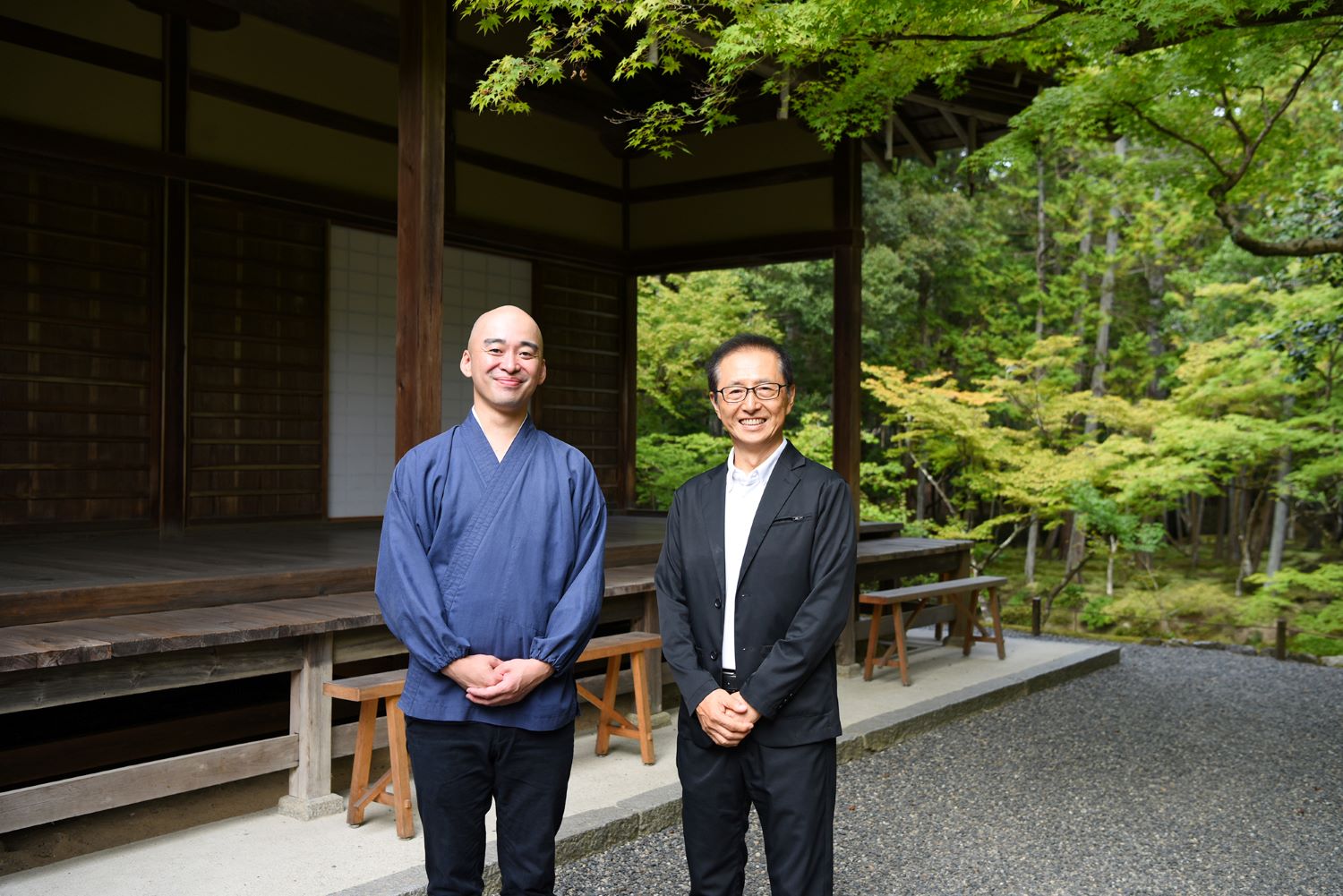2024.6.20
体露金風 西芳寺 第二景
ピーター・J・マクミラン
(翻訳家・詩人)
翻訳者であり詩人でもあるピーター・マクミラン氏が、西芳寺の魅力を綴る「西芳寺百景」シリーズ。日本文化への造詣が深いピーター氏の感性と深い洞察が誘う、心の旅。ぜひ原文の美しい響きも、ご堪能ください。
苔寺は、たとえその名前が変わっても美しい緑の景色は、変わらない
世界的に有名な、シェイクスピアの戯曲「ロミオとジュリエット」。この物語の中で、ジュリエットがこんな言葉を残しているのは、ご存じですか?
名前がなんだっていうの? 私たちがバラと呼ぶものは 例えその名前が変わっても 香りは変わらないというのに。
英語の有名な言葉、“A rose by any other name would smell as sweet ”(バラはどんな名前であっても、その香りは変わらない)の元になった台詞です。
この物語では、ジュリエットとロミオは代々敵対してきた家系に生まれ、それ故に結婚を許されませんでした。ジュリエットがこの台詞で伝えたいのは、名前がなんだというのか、ロミオが宿敵モンタギュー家の生まれだなんて関係ない、ということ。ロミオをバラに重ねることで、彼がロミオという名前でなかったとしても、その美しい姿と彼女の恋人であることに変わりはない、と訴えているのです。のちにこの言葉は英語圏で、大切なのは名前ではなく中身そのものであるという意味で、よく使われるようになりました。
とはいえ、ものをどう呼ぶかはやはり重要で、英語と日本語では、同じ言葉であっても受け取り方が異なるときがあります。西芳寺のコンセプト、「調律と閃きの庭」をそのまま英語にすると、“The Garden of Tuning and Inspiration”となるのですが、「Inspirationを受ける」は十分に理解できるものの、「自分自身をTuningする」に関しては、なかなか意味を掴みにくいのです。お寺との話し合いを重ねる中で気づいたのは、英語と日本語では違う伝え方を考えなければならないときもあるということ。こうして私は、英語で西芳寺を表すにはどんな名前が良いか考えはじめました。

西芳寺の僧侶・藤田執事長が教えてくれたのは、このお庭は、うまくいかなかったことへの反省を含め、今までの人生で経験してきたことすべてを振り返り、新たな一歩を踏み出す場所だということ。ですが、「うまくいかなかったことを反省する」という考えは、海外から日本を訪れる人にとっては少しネガティブに聞こえるような気がします。藤田執事長が言う理念を尊重しながらも、英語でもしっくりくるコンセプトになるように工夫しようと思いました。
ある朝、お庭を歩いていると、池の端に浮かぶ小舟が目に留まりました。私のお気に入りの小舟です。なんといっても、その小舟が今にも未知の旅へと出てゆこうとしている様子を思い浮かべると、満ち溢れゆく可能性を感じるのですから。そこから、ふと「旅」というアイディアが浮かんできました。そして、振り返るとは自分の原点に立ち戻ることではないか、と思ったのです。この言葉には、ただ反省するだけではなく、生まれたときから今この瞬間に至るまでを振り返り、これからに繋げていくという意味もあります。このお寺を訪れる人が原点に戻るとき、それは新たな旅路を歩み始めようとしているときではないでしょうか。お庭を回り終えたとき、すでに私の頭の中には“The Garden of Origins and Journeys” という名前が浮かんでいました。お庭がこの名前を教えてくれたのです。私はただその想いに耳を澄ませ、書き留めました。
もし苔寺が別の名前で呼ばれたら、その苔庭のもつ美しい緑の景色は消えてしまうのでしょうか?
さて、ジュリエットの言葉を借りてこのお話を終えましょう。
私たちが苔寺と呼ぶものは、 たとえ名前が変わっても、 その緑の美しさは変わりません。
A Moss Garden by Any Other Name Would be Just as Green
Many of the readers will be familiar with the famous lines of Shakespeare’s play Romeo and Juliet:
What's in a name? That which we call a rose
by any other name would smell as sweet.
This is the origin of the popular adage in English which paraphrases the original: “A rose by any other name would smell as sweet.”
In the play Juliet and Romeo were from families that were mortal enemies of each other so they were not allowed to marry. Juliet’s lines assert that the names of things are not important and that it is not important that Romeo is from her family’s rival house of Montagu. Comparing Romeo to a rose she implies that even if his name was not Romeo, he would still be very handsome and still be her love. Later the adage came to be used often to show that names are not important but the substance of something is what is important.
However, the naming of things is highly important and there are often differences in the way we perceive titles in English and Japanese. The sub-name for Saihoji in Japanese is choritsu (tuning) and hirameki (inspiration). It is a little hard to grasp in English what is meant by “tuning” oneself on a visit to the garden, though the idea of being inspired is highly comprehensible. In my conversations with the temple, we realized that we would sometimes have to create separate copies in English and Japanese. And that is when I started thinking of another sub-name for the garden.
The Vice Head Monk Mr. Fujita told me that his idea of the garden was as a place of reflection, including reviewing one’s failures, on all the things that had happened in one’s life to this point, so that one could make a new beginning, but I felt that the idea of reflecting on one’s failures was a little negative for non-Japanese. I wanted to honor Fujita’s basic concept but also adapt it to a natural way of thinking in English.
One morning while I was walking in the garden, I noticed the little boat in a corner of the pond. I have always loved to see that little boat as it seems full of the sense of possibility as I always imagine it about to set off on some mythic journey. That gave me the idea of journeys. And then I adapted the idea of reflection to returning to one’s origins— it includes reflection, but also can mean a highly positive re-evaluation of one’s life from one’s beginnings to the present moment. When the visitors return to their origins, they will be ready to embark on new journeys. By the time I finished my walk in the garden the name “The Garden of Origins and Journeys” had formed in my mind. The garden taught me the name. I just listened to her thoughts and wrote them down.
Would the moss garden be just as green if it had another name? I end with a new version of Juliet’s speech:
That which we call moss garden
by any other name
would be just as sweet and green!
Peter MacMillan ピーター・J・マクミラン
翻訳家・詩人。株式会社 月の舟(制作・翻訳会社) 代表取締役。
2008年に英訳『百人一首』を出版し、日米で翻訳賞を受賞。2016年9月には英訳『The Tales of Ise』(伊勢物語)、2017年には英訳『One Hundred Poets One Poem Each(新訳)』の2冊がPenguin Booksより出版される。近著に『日本の古典を英語で読む』『英語で味わう万葉集』など著書多数。2019年より朝日新聞にて「星の林に」、2022年より京都新聞にて「不思議の国の和歌ワンダーランド 英語で読む百人一首」を連載。

翻訳:福田安奈






